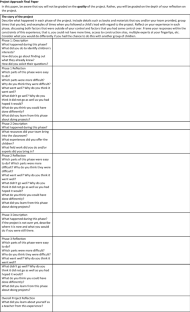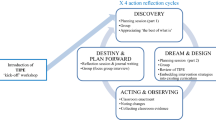Abstract
Project approach allows early childhood teachers to use both child-initiated and teacher-facilitated instructional methods. This article describes what we learned from a study focused on project approach professional development for early childhood teachers who later served as mentor teachers during a field experience for an introductory methods course. The mentor teachers saw their role as guides and supports for early childhood preservice teachers who were placed in teams in their classrooms to implement project approach. Interviews with mentor teachers and document reviews of preservice teacher reflection papers reveal that preservice teachers gained understanding about how child engagement can be fostered through project work and the importance of working as a team. Mentor teachers wanted university faculty to take a more active role in supporting team communication, make visits to the classroom and situate project work in a field experience with enough hours to get to know the children and fully develop each phase of the project. Implications for early childhood teacher educators seeking to incorporate project work in preservice field experiences are shared.

Similar content being viewed by others
References
Alfonso, S. (2017). Implementing the project approach in an inclusive classroom: A teacher’s first attempt with project-based learning. Young Children, 72(1). Retrieved from http://www.naeyc.org/publications/vop/implementing-inclusive-classroom
American Association of Colleges for Teacher Education. (2018). A pivot toward clinical practice, its lexicon, and the renewal of educator preparation. Retrieved from https://aacte.org/resources/research-reports-and-briefs/clinical-practice-commission-report/
Baum, A. C., & Korth, B. B. (2013). Preparing classroom teachers to be cooperating teachers: A report of current efforts, beliefs, challenges, and associated recommendations. Journal of Early Childhood Teacher Education, 34(2), 171–190.
Beneke, S. & Ostrosky, M. M. (2009). Teachers' views of the efficacy of incorporating the Project Approach into classroom practice with diverse learners. Early Childhood Research & Practice, 11 https://files.eric.ed.gov/fulltext/EJ848843.pdf
Blank, J., Damjanovic, V., DaSilva, A. P. P., & Weber, S. (2014). Authenticity and “standing out”: Situating the Project Approach in contemporary early schooling. Early Childhood Education Journal, 42, 19–27. https://doi.org/10.1007/s10643-012-0549-2
Bredekamp, S. (Ed.) (1987). Developmentally appropriate practice in early childhood programs serving children from birth through age 8. National Association for Education of Young Children.
Bredekamp, S., & Copple, C. (1997). Developmentally appropriate practice in early childhood programs (Revised Edition). National Association for the Education of Young Children.
Brown, C. P., & Feger, B. S. (2010). Examining the challenges early childhood teacher candidates face figuring their roles as early educators. Journal of Early Childhood Teacher Education, 31, 286–306. https://doi.org/10.1080/10901027.2010.523774
Copple, C., & Bredekamp, S. (2009). Developmentally appropriate practice in early childhood programs serving children from birth through age 8. National Association for the Education of Young Children.
Couse, L. J. & Recchia, S. L. (Eds.) (2016). Handbook of early childhood teacher education. Routledge.
Creswell, J. (2007). Data analysis and representation. In J. Creswell (Ed.), Qualitative inquiry and research design: Choosing among five approaches (2nd ed., pp. 179–212). Sage.
Curby, T. W., LoCasale-Crouch, J., Konold, T. R., Pianta, R. C., Howes, C., Burchinal, M., Bryant, D., Clifford, R., Early, D., & Barbarin, O. (2009). The relations of observed pre-k classroom quality profiles to children’s achievement and social competence. Early Education and Development, 20(2), 346–372. https://doi.org/10.1080/10409280802581284
Eckhoff, A. (2017). Partners in inquiry: A collaborative life science investigation with preservice teaches and kindergarten students. Early Childhood Education Journal, 45, 219–227.
Edwards, C., Gandini, L., & Forman, G. (1993). The hundred languages of children. Ablex Publishing.
Graue, E. (2008). Teaching and learning in a post-DAP world. Early Education and Development, 19(3), 441–447. https://doi.org/10.1080/10409280802065411
Graue, M. E., Ryan, S., Nocera, A., Northey, K., & Wilinski, B. (2017). Pulling preK into a K-12 orbit: The evolution of preK in the age of standards. Early Years, 37(1), 108–122. https://doi.org/10.1080/09575146.2016.1220925
Harris, K. I., & Gleim, L. (2008). The light fantastic: Making learning visible for all children through the Project Approach. Young Exceptional Children, 11(3), 27–40.
Harte, H. A. (2010). The project approach: A strategy for inclusive classrooms. Young Exceptional Children, 13(3), 15–27.
Hatch, J. A. (2002). Accountability shovedown: Resisting the standards movement in early childhood education. Phi Delta Kappan, 83(6), 457–462.
Helm, J. K. (2015). Becoming young thinkers: Deep project work in the classroom. Teachers College Press.
Helm, J. H. & Katz, L. (2016). Young investigators: The project approach in the early years. (3rd ed.). Teachers College Press.
Hirsch, E. D., & Moats, L. (2001). Overcoming the language gap. American Educator, 25(2), 4–9.
Katz, L. & Chard, S. (2000). Engaging children's minds: The project approach (2nd ed.). Ablex.
La Paro, K. M. (2016). Field experiences in the preparation of early childhood teachers. In L. J. Couse & S. L. Recchia (Eds.), Handbook of early childhood teacher education (pp. 209–223). Routledge.
Lincoln, Y., & Guba, E. G. (1985). Naturalistic inquiry. Sage.
Maynard, C., La Paro, K. M., & Johnson, A. V. (2014). Before student teaching: How undergraduate students in early childhood teacher preparation programs describe their early classroom-based experience. Journal of Early Childhood Teacher Education, 35(3), 244–261. https://doi.org/10.1080/10901027.2014.936070
Mitchell, S., Foulger, T. S., Wetzel, K., & Rathkey, C. (2009). The negotiated project approach: Project-based learning without learning the standards behind. Early Childhood Education Journal, 36, 339–346.
Moran, M. J. (2007). Collaborative action research and project work: Promising practices for developing collaborative inquiry among early childhood preservice teachers. Teaching and Teacher Education, 23, 418–431.
National Association for the Education of Young Children. (2019). Professional standards and competencies for early childhood educators: A position statement of the National Association for the Education of Young Children. Author.
National Association for the Education of Young Children. (2020). Developmentally appropriate practice (DAP) position statement of the National Association for the Education of Young Children. Author.
National Council for Accreditation of Teacher Education (NCATE). (2008). Professional standards for the accreditation of teacher preparation institutions. NCATE.
National Research Council (NRC). (2010). Preparing teachers: Building evidence for sound policy. Author.
Spodek, B., & Saracho, O.N. (2003). On the shoulders of giants: Exploring the traditions of early childhood education. Early Childhood Education Journal, 31, 3–10. https://doi.org/10.1023/A:1025176516780
Vandenbroucke, L., Spilt, J., Verschueren, K., Piccinin, C., & Baeyens, D. (2018). The classroom as a developmental context for cognitive development: A meta-analysis on the importance of teacher-student interactions for children’s executive functions. Review of Education Research, 88(1), 126–164.
Walkington, J. (2005). Mentoring preservice teachers in the preschool setting: Perceptions of the role. Australian Journal of Early Childhood, 30(1), 28–32.
Wastin, E., & Han, H. S. (2014). Action research and project approach: The journey of an early childhood preservice teacher and a teacher educator. Networks, 16(2), 1–12.
Whitebook, M. & Bellm, D. (2013). Supporting teachers as learners: A guide for mentors and coaches in early care and education. American Federation of Teachers.
Zimiles, H. (1997). Viewing education through a psychological lens: The contributions of Barbara Bilber. Child Psychiatry and Human Development, 28(1), 23–31. https://doi.org/10.1023/A:1025141018392
Author information
Authors and Affiliations
Corresponding author
Additional information
Publisher's Note
Springer Nature remains neutral with regard to jurisdictional claims in published maps and institutional affiliations.
Rights and permissions
About this article
Cite this article
Donegan-Ritter, M., Zan, B. & Pattee, A. Reflections on Project Work in Early Childhood Teacher Education. Early Childhood Educ J 51, 407–418 (2023). https://doi.org/10.1007/s10643-022-01307-4
Accepted:
Published:
Issue Date:
DOI: https://doi.org/10.1007/s10643-022-01307-4



